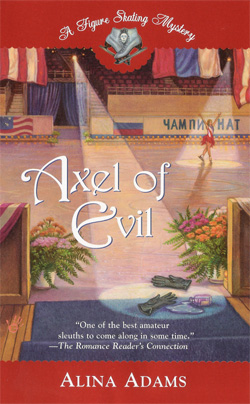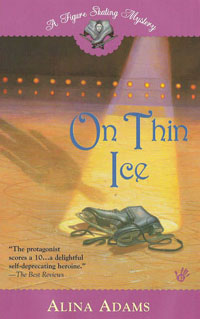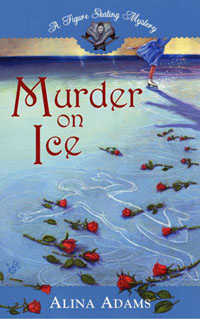Chait: One has to work and fight.Translation of an interview with Galit Chait (GK) by Anna Savchik (AS) printed in the Ukrainian publication Sport.com.ua on January 18, 2008.The former figure skater is currently the coach of the Ukrainian ice dance duet of Anna Zadoroznuk and Sergey Verbillo.
Not that long ago, Galit herself went out on ice, but now she stays off the ice as a coach. But if one would observe this famous Israeli figure skater for just a few minutes, one would not claim that she was not skating any more. She mentally repeats every move of her pupils and no less emotionally than them performing the dance.
Anna and Sergey are her first real pupils. That is why she is surrounding this young dancing duet with such loving and tender care. She did not hesitate to come with them to Kiev to participate in the Ukrainian Championship. Incidentally it was not her first visit to the capital of Ukraine.
GC – I was here fifteen years ago with my parents who brought me here to practice with local coaches. Ukrainian specialists were always held in high esteem in the world of figure skating. We stayed at the Olympic sports base. Kiev was very pretty in the summertime. But even more than the architecture I was impressed by the kind and friendly people.
AS – I presume that this memory was somewhat spoiled by the modest size of the rink “Ldinka” where the Championship took place.
GC - I was expecting a little bit more, but the rink was not that bad. As a coach I am happy with everything. There is only one large ice rink in Israel located in Metulla. There are comfortable conditions for practice and there are a lot of people there. Not everything depends on pupils. No matter what is the level of the talent of the child, the coach is needed to bring the talent to the high level.
AS - Would you consider the perspective to move from America to Israel?
GC – Whenever I can, I come over and help in Metulla. But I can not move there for good and lose the unique chance to work with Nikolay Morozov. I consider him a genius. He is an endless source of ideas. I am learning from him every day. But in addition to his tremendous talent as a coach and choreographer, he has a unique ability to create a special atmosphere among his students. In addition to the Ukrainian couple, he is currently coaching ice dancing duets from Israel, Japan, Azeibardjan and Georgia. They help each other. They explain to each other during the practice how to perform different elements. In a short time they will be competing with each other. They do not have any arguments or express any jealousy. It is hard to believe that it could be like that. I know what I am talking about since I was coached by many different coaches.
AS – Tatiana Tarasova pays you a lot of compliments. What did you have to do to reach the rank of a favorite student of such a legendary coach?
GC – I also love her very much. She taught me the main thing – to put my soul into everything I do. There was no single day that she would come to practice in a bad mood, she was always charged to work, and she had so much energy. I could not understand how she could do it than, and now, becoming a coach myself, I understand it even less. She forgets about herself and thinks only about her students. In general, every coach gave me something. Natalia Linichuk taught me to work harder, Natalia Dubova taught me to be strong. Incidentally, the choreographer of my first program was Nikolay Morozov when he began his coaching career.
AS – How do you divide your responsibilities with him in working with the Ukrainian couple?
GK – Nikolay is the boss. He produced all of the numbers. I work with the students on their compulsory program and not only on the ice, but in the gym. I love Anna and Sergey very much. This is my first pair, I am learning with them and they help me a lot. Actually, two years ago I practiced with them at the same time at the World Championship. I always liked them and I did not think twice when Mr. Morozov proposed that I would work with them as a coach. At that time I was coaching young children. Sergey Sakhnosvky broke his leg and I was waiting for him to recover. I wanted to go on skating, but apparently my partner had different plans.
AS – Was the bronze won by your couple at the Grand Prix in Moscow your first medal as a coach?
GK – Yes, and I was feeling like we won the Olympics. I was not as happy with my own medals as I was happy for my students at the Cup of Russia competition. They grew up a lot in the last year. Their skating became really adult and emotional. This couple differs from the others mainly by the cleanness in performing the elements. All of the runs and turns were not just interesting, but also performed with high quality. The bronze showed that they were taken seriously at the world stage and that they may be real contenders for the medals.
AS – In Kiev your couple skated worse than at the Grand Prix in Beijing and Moscow. Is there another explanation why they let the lower ranked couple of Alla Beknazarova and Vladimir Zuev take the title of the Ukrainian Champions?
GK – The Chinese Grand Prix was the fist start for my students and they made mistakes. In Moscow they felt surer in themselves and went on the attack. In Kiev, Anna and Sergey worked well, although in the original program they made a mistake and were penalized for it. They were very good in the free program. I felt bad for them that they did not win the Ukrainian Championship although I think that they skated better than the Champions. I asked them not to give up and I know that they would be strong and understand everything. It is much more important that they perform well in the international competitions.
AS – Are you nostalgic for the old system of judging?
GK – Yes, I miss the marks “6.0”. The system changed, but the subjectivity remained. In the past everyone could see who gave what marks. Now the spectators do not understand anything. Maybe it is better for single skaters, but for pairs it became worse. It seems simple – you skated well, you get good marks. But reality is not that simple.
AS – Would you agree that the new rules make skating a compilation of elements, without room for creativity?
GK – Everything depends on the choreographer. Nikolay produced a program that both judges and spectators liked. The composition called “Nostradamus” was very well accepted and Anna and Sergey looked very good in it.
AS – When you were skating did you like more classical or contemporary programs?
GK - I love skating and I liked all programs. I liked most the program called “Paganini” created by Tarasova and Morozov. But we won the 2002 World’s Championship medal for a Jewish dance created by Natalia Dubova. Actually we had 2 versions of that dance – the fist one was prepared by Natalia Linichuk for the Nagano Olympics.
AS – Do you remember your only World Championship medal with happiness or with negativity?
GK – Margarita Drobjazko and Povilas Vanagas claimed that we did not deserve the medal. One could understand the Lithuanian couple: they were elderly, never won anything serious. That Championship was their last chance to win something. But what they did did not really help them in their skating. Many people who signed their petition apologized to us later. I forgave some and did not the others. In that case the signatures of Bulgarian skaters Maxim Stavisky and Albena Denkova weighted a lot. As you know, fate was tough on him lately.
AS – Some specialists think that after that scandal the judges did not want to put your pair on the pedestal.
GK – It may be the case, but it made me stronger. And it does not hurt me in my work as a coach, it rather helps. I am not afraid of anything and I can pass my self-assurance to my students. We have the medal; the Lithuanians have only a piece of paper. We made history as the first Israeli skaters who won a medal at the World’s Championship. People remember that, rather than a scandal. We also had situations when we were upset with the judges. I was crying many times when we lost to couples who fell down, but we never stooped down to writing a petition. We went back home and worked harder, since the injustice could be overcome only with the hard work.
AS – I remember that you fell in Turin and it eliminated all of your chances there.
GK – Yes it was the first time in all of our life as skaters that we fell down in the compulsory program. I do not even know why it happened. I was absolutely calm, I just tripped. It happens – the ice is slippery. The next day all the favorites fell down as well. It seemed that I started a trend.
AS – Maybe the reason was that you were carrying the flag at the opening of the Olympics. In the Ukrainian team it is considered bad luck to carry the flag since very often the flag carriers were dropped off the team.
GK – I was carrying the flag not only in Turin, but also in Salt Lake City. There everything was fine. I considered it an honor. Israel gave me a chance to do what I liked most. Actually in my life there were three Olympics. I hope to go to the forth one as a coach.
AS – Based on your own sports experience, what would you like to protect your students from?
GK – I would do my best to make sure that they do not pay attention to the minor things and would see only the big goal in front of them. They should not be afraid of anything with a coach like Nikolay Morozov. They have to work and to fight. If you believe in what you are doing, you may achieve everything!
AS – Galit, you speak very good Russian.
GK – Thanks for the compliment. My parents talked to me in Russian when I was a child, but I wanted to communicate only in English. I lived at that time in the USA. I had to learn Russian when I came to practice in Moscow when I was 16. I am happy that I know Russian and can communicate with many sportspeople and coaches. Once at the competitions I asked a Russian friend the meaning of a word and he was very surprised that I was not Russian, since my name translated into Russian is Galina.





